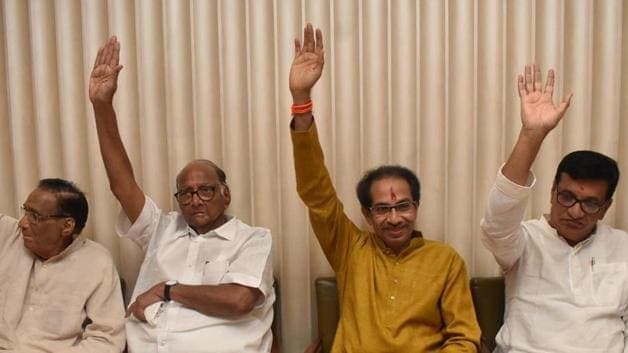
Next week, the Maharashtra Vikas Aghadi government of three parties—Shiv Sena, NCP and Congress —will be completing two months in office. The government was formed by the three parties in an unexpected manner after the BJP and Shiv Sena failed to work out a power-sharing pact even though their pre-poll alliance won a majority. There were doubts whether this government would be formed since the Sena's ideology is completely different from that of the Congress. It was finally formed, but there is still uncertainty about its survival. Not just the opposition BJP, but many in the ruling parties, too, doubt if this government will last beyond a year or two. Most optimistic people in these parties are giving it three to five years, depending on how much faith they have in two key players—NCP chief Sharad Pawar and CM Uddhav Thackeray—whose roles will be crucial for survival of the government.
During the MVA government's tenure so far, what is clearly visible is that the three parties are not on the same page over various issues. Shiv Sena's flip-flop on the issue of National Register of Citizens and Citizenship (Amendment) Act was the best example. The party voted for CAA in Lok Sabha and staged a walkout in the Rajya Sabha after objections raised by ally Congress. NCP chief Pawar publicly demanded that the government should order an independent probe into the cases filed against activists in the Bhima-Koregaon case, but CM Thackeray chose not to act on the same immediately. Following the cabinet expansion, the home department has gone to the NCP and he would prefer the NCP minister himself take a decision on the same, say Sena insiders.
On the issue of VD Savarkar, the Sena continuously takes a stand contradictory to that of the Congress. Senior leaders of both parties have been making public statements that are embarrassing for Thackeray and his government. The MVA partners have succeeded in creating a clear impression that the three parties are together just for power and they don't care for each other's image or ideology. While it is true in case of all political parties that power is the only binding factor for them, they at least pretend to be together for certain issues. In this case, the MVA partners are not bothering to pretend so. Little wonder that in past two months the controversies related to the three ruling parties and their government made more headlines than any decisions taken by the new government.
It is also clear that the government itself lacks discipline and coordination among its partners and their ministers. Several ministers are not very happy with deputy CM Ajit Pawar holding meetings of their departments and announcing decisions in their absence. He announced that the eastern freeway in Mumbai would be named after former CM late Vilasrao Deshmukh, the height of Dr Ambedkar's proposed statue at Prabhadevi will be increased and Marathi could be mandatory in all schools in the state irrespective of their governing boards. Though NCP says he took the meetings in his capacity as state's finance minister and was tapping ways to increase resources, the concerned ministers are not happy. They are also pointing out none of these announcements had anything to do with finance. They also point out that the deputy CM does not have powers like the CM who can take decision on behalf of any department. It is just a political arrangement, not a constitutional post, they say. They are hoping this is just initial enthusiasm and would stop soon.
The other decision that is being talked about is tourism minister Aaditya Thackeray's pet project to allow shops and restaurants to conduct business throughout the night. Mantralaya officials say none of the three departments concerned—home department which governs police, labour department which decides timing of the shops and other establishments, and excise department which issues liquor licences — were aware about the announcement till it was made. It also led to a flip-flop by home minister Anil Deshmukh who had expressed concern about over-burdening the police force. Are there chances that the three parties will overcome the initial hiccups (as their leaders say), avoid unnecessary controversies and start the work they had promised? Or is the series of controversies an indication of what they would be resorting to in the coming days?